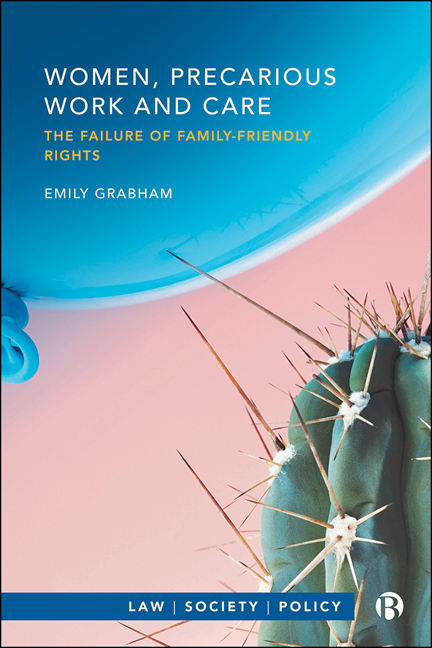Book contents
- Frontmatter
- Contents
- List of Figures
- Acknowledgements
- Series Editor’s Preface
- one Introduction
- two Starting and Surviving in Precarious Work
- three Providing Care: Daily Routines and Experiences
- four Care Networks
- five “Rocking the Boat”: Talking about Care in a Precarious Job six How Employers Responded
- six How Employers Responded
- seven What Women Did Next
- eight Care-Friendly Rights for Precarious Workers
- Appendix How the Research Was Conducted
- Index
one - Introduction
Published online by Cambridge University Press: 13 May 2022
- Frontmatter
- Contents
- List of Figures
- Acknowledgements
- Series Editor’s Preface
- one Introduction
- two Starting and Surviving in Precarious Work
- three Providing Care: Daily Routines and Experiences
- four Care Networks
- five “Rocking the Boat”: Talking about Care in a Precarious Job six How Employers Responded
- six How Employers Responded
- seven What Women Did Next
- eight Care-Friendly Rights for Precarious Workers
- Appendix How the Research Was Conducted
- Index
Summary
It's a cold spring morning and Renuka and I are sitting in a coffee shop in Harrow. Renuka has agreed to be interviewed about her experiences of balancing zero-hours work in a high-street shop with caring for her two young children. We have been talking for nearly an hour. I say to her: “If you had to draw what it feels like to be doing what you are doing right now with work and with the kids, what would you draw?”
Renuka starts sketching. “It would be a headless chicken”, she says. “I can't draw a chicken. I am just going to put a box and put ‘chicken’ ”. She draws the square outline of her chicken body and labels it ‘Chicken's body’.
“These are my hands”, she says, drawing stick arms out to each side. “These are my legs, because I am running”. She draws clouds of dust under her stick feet to show speed.
“You are running quite fast there”, I say.
“I need to juggle”, Renuka says. “Meals. Work. And the reason I don't have a head is because it's filled with money worries and so it's not functioning”.
The headless chicken sits for a moment on the page, with its speedy feet and boxes floating to either side. Renuka labels each of these boxes in turn: meals, work, children. Then we both pause and look at what she's created. Quietly, she draws another box, which hovers above the chicken's body like an empty rectangular halo. Renuka adds a label: ‘money worries’.
“This”, she says, pointing to the ‘money worries’ box, “is independent of what's going on here”. She points to the body and hands. Only later, after I have asked her what her head would look like if she didn't have money worries, does Renuka add the smiling face that we can see in Figure 1.1. “I’d still be running around”, she says. “But I would be happy”.
Renuka's story mirrors the experience of many women who balance precarious work with caring for their children or family members. Women are the majority of those on temporary, zero-hours and involuntary part-time contracts in the United Kingdom.
- Type
- Chapter
- Information
- Women, Precarious Work and CareThe Failure of Family-friendly Rights, pp. 1 - 11Publisher: Bristol University PressPrint publication year: 2021



